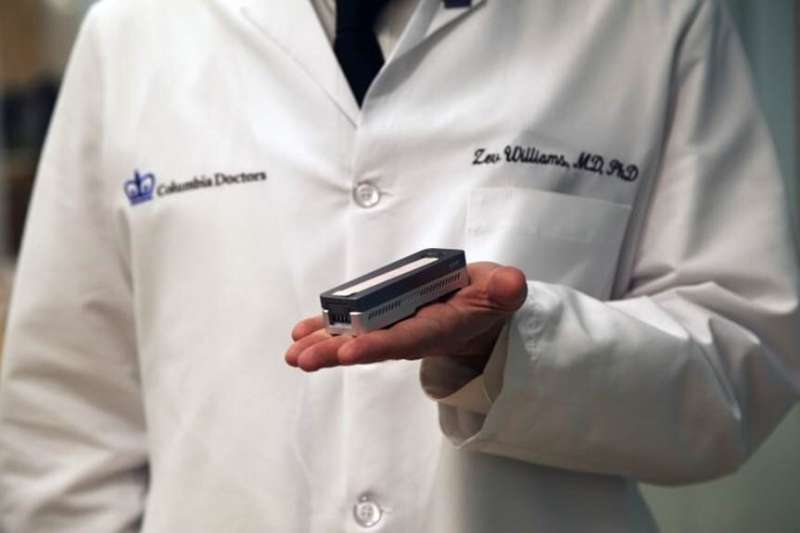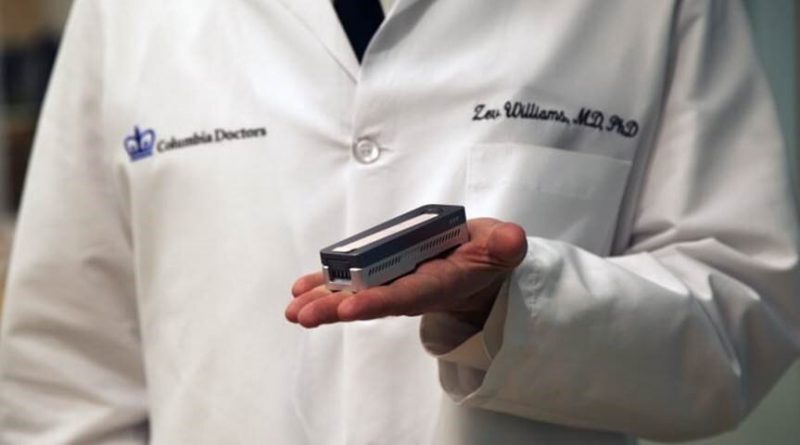New prenatal test can reduce time, cost of detecting chromosomal abnormalities

A new prenatal test developed by researchers at Columbia University Fertility Center can determine if a fetus or embryo has the right number of chromosomes at a fraction of the time and cost of currently available clinical genetic tests.
Currently available prenatal genetic tests cost thousands of dollars and take days to weeks to deliver results, adding to the emotional and financial stress of fertility treatment and pregnancy and impacting treatment options.
The new test, called STORK (Short-read Transpore Rapid Karyotyping), can be used in the doctor’s office at the point of care, delivers results in under two hours, and is about 10 times less expensive to process per sample than current tests.
Details about the test—which is awaiting authorization from New York State Department of Health before it can be offered to Columbia patients—and its performance were published in the New England Journal of Medicine.
“We are developing the most advanced technologies to solve some of the most ancient of afflictions—infertility and pregnancy loss,” says study leader Zev Williams, MD, Ph.D., the Wendy D. Havens Associate Professor of Women’s Health and chief of the division of Reproductive Endocrinology and Infertility at Columbia University Vagelos College of Physicians and Surgeons. “Our hope is that this test will help improve women’s health, lower costs, and improve access to treatment.”
The chromosomal abnormalities that this test can detect are, by far, the most common causes of miscarriage, structural anomalies, and developmental delays. Prenatal genetic testing is recommended for pregnant women who are age 35 or older, have a family history of genetic disorders, or have had one or more miscarriages. It is also used increasingly during in vitro fertilization (IVF) to test embryos prior to implantation to improve the chances of pregnancy and reduce the risk of miscarriage.
Like currently available prenatal genetic tests, the new test examines tissue from a biopsy of the placenta or IVF embryo to determine if it has a normal number of chromosomes. With current tests, however, samples obtained in a doctor’s office must be shipped to a specialized laboratory that either grows cells in a dish or uses expensive technology to analyze DNA, adding to the time and cost.
“What’s so exciting is that STORK can be used to rapidly assess chromosomal health across all reproductive tissue types,” Williams says. “For those patients who are trying to get pregnant through IVF, the test gives the ability to conceive sooner. For those who are already pregnant, it gives more time to make important family-planning decisions. For those who have had a miscarriage, it can show why the loss happened so that steps can be taken to prevent future pregnancy losses.”
Harnessing latest technology
In a method pioneered by Williams and his team, nanopore-based sequencing technology is used to analyze tiny fragments of DNA 15,000 times faster than currently available chromosomal testing methods, significantly reducing the amount of time to get results.
The test also uses much smaller equipment—about the size of a harmonica and weighing just 450 grams—making it accessible for use in physician offices.
Test performance
The researchers tested STORK in 218 blinded samples from miscarriages, pregnancies (via amniotic fluid or chorionic villi—tiny growths in the placenta), and biopsies from embryos prior to implantation. Results were compared with those obtained using standard clinical testing. STORK results agreed with standard clinical testing in all of the pregnancy-related samples and in 98% of the embryos tested. For miscarriage samples, STORK was more accurate than standard testing and was determined to have correctly identified chromosome numbers in the 10 cases for which the two tests disagreed.
An additional 60 pregnancy samples were tested with STORK at an independent certified laboratory, and those results were identical to results obtained with standard clinical testing.
Applications for IVF and miscarriage
IVF embryos, which are typically biopsied for chromosomal testing on day five or six, are frozen for weeks until they can be transferred to a woman’s uterus, adding thousands of dollars to the cost of fertility treatment. Freezing may be unnecessary with rapid tests, as normal embryos could be transferred immediately.
Source: Read Full Article



